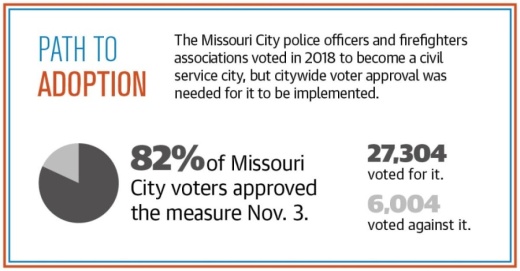Civil service establishes a standardized test for the hiring and promotion processes, which its proponents said eliminates nepotism and creates opportunities for upward mobility within the department. Furthermore, under civil service, disciplinary action must be justified, and employees have the ability to appeal action taken against them.
“What civil service does is it brings professionalism to the police departments and the fire departments and eliminates what I would call the ‘good old boy’ system or cronyism,” said John Sierega, the director of field services and public affairs at the Texas Municipal Police Association.
Sgt. Jay McClellan, the vice president of the Missouri City Police Association, said the organization was formed in 1992 for the purpose of seeking civil service, but previous talks and attempts had failed.
However, after circulating a petition in 2018 and acquiring the necessary number of signatures to get on the ballot, 82% of Missouri City voters approved the measure Nov. 3.
Standardizing practices
In the 23 years Greg Ybarra has been with the Missouri City Fire & Rescue Services department, he has worked under 34 different bosses, something he said has contributed to inconsistencies in policies and practices.
“If you become the fire chief, you’re entitled to your own vision, to your own approach,” said Ybarra, the president of the Missouri City Professional Firefighters Association. “But in my 23 years, you always have to adjust 34 times.”
Chapter 143 of the Texas Local Government Code, which established the civil service system for firefighters and police officers, was passed by the Texas Legislature in 1947 and needs voter approval to be adopted at the city level.
In 2014, the police association voted to become a civil service city, but a petition was never circulated, McClellan said. Following another vote in 2018, members of the Missouri City Police Association and Missouri City Professional Firefighters Association dedicated their days off to collecting more than 3,000 signatures, of which 1,900 were certified by the city—more than the 798 needed to get the initiative on the ballot.
With voters ratifying the adoption, Missouri City joins several Houston-area and more than 90 Texas civil service cities.
Ybarra said adopting the civil service initiative will bring fair hiring practices to the department and eliminate the slew of changes he has experienced over the years in the entry, promotion and disciplinary processes.
“Not one single promotional process since I’ve been with the department has ever been the same,” Ybarra said. “And that creates an internal struggle, a morale issue.”
While both the Missouri City police and fire departments have hiring and promotion testing systems in place, McClellan said adopting the civil service system will codify these practices into law.
“Policy can easily be changed with the stroke of a pen, depending on administrations,” McClellan said.
Furthermore, under civil service, McClellan said potential nepotism is taken out of the process.
“[Under civil service], you can’t just say, ‘Hey, I got a good buddy of mine; I’ve known him for years; I’m going to make him a supervisor,’” McClellan said. “It’s a test to promote.”
While Ybarra said he has not seen nepotism in the fire department, there have been “questionable practices” with administrators hand-picking applicants for open positions.
“Most departments ... will claim that they’re professional and that they don’t have the cronyism and that they don’t have the good old boy system, but I can tell you as a representative of over 30,000 Texas peace officers, cronyism exists, and the good old boy system is alive and well,” Sierega said.
John Riddle, the president of the Texas State Association of Fire Fighters, said some of the biggest pushback against the adoption of the civil service system has been from police and fire chiefs who no longer have a “good old boys” system.
“That’s why we like the law and promote the law because then you don’t get a promotion based on whether or not the fire chief likes or dislikes you,” Riddle said.
Disciplinary measures
In addition to establishing regulations for the hiring and promotion processes, disciplinary action against police officers and firefighters is also governed by the civil service system.
“If your department is not a civil service department, then you are an at-will department, which means an officer can be fired for a good reason, a bad reason or no reason at all,” Sierega said.
For comparison, Sierega said under the civil service system, there has to be a cause for discipline, he said.
With police officers nationwide under heightened scrutiny following the death of George Floyd in Minneapolis this summer and the deaths of other Black Americans at the hands of police officers, Sierega and McClellan both said civil service does not make it harder to discipline a police officer.
Under the system, police and fire chiefs can take disciplinary action against an officer according to Texas Local Government Code Chapter 143 and local department policies. The civil service law then gives an officer or firefighter who feels he or she was wrongly punished the option to appeal to the Missouri City Civil Service Commission or a third-party arbitrator.
“We wanted to make sure that our people had due processes—that they had some sort of mechanism in which they could appeal discipline they felt was unfair, which is granted under civil service,” McClellan said.
City Council Member Floyd Emery, who said he supported the adoption of the civil service law, said he thinks its adoption eliminates an officer being disciplined without good cause.
“I think it just runs it through another process that looks at all of the factors involved in whatever type of actions trying to be taken to make sure that they’re valid considerations or concerns, as proven by fact and not by innuendo or social media postings,” Emery said.
Planning for the future
McClellan said all the employees in Missouri City’s police department command staff are eligible to retire, and the adoption of the civil service will help with succession planning moving forward.
“We wanted to secure the people under those command staff members and see them rise through the ranks and take over the police department eventually,” McClellan said.
Under civil service, all positions save for a few at the top of each department are required to be filled internally, something Ybarra said is a huge morale booster as members of the department see paths to move up in rank.
Additionally, both Ybarra and McClellan said Missouri City puts a significant amount of time and resources into training new members of the departments. Ybarra said the civil service environment will create may encourage people to stay.
“The reason that we were seeking civil service [is] ... we’re looking to secure the future here. We invest in our officers; we train our officers well here,” McClellan said. “And we started to see a pattern of officers coming in—quality people coming in—and getting hired and being trained and then leaving to go elsewhere.”
Missouri City has until the beginning of the next fiscal year in October 2021 to implement the civil service law, according to Ric Navarro, a civil service lawyer who presented at an Oct. 5 City Council meeting.
In that year, Navarro said the city will need to establish its civil service commission—which will adopt local rules pertaining to the execution of the civil service system—and City Council will have to pass certain ordinances to put the system in place.
The city accepted applications for the commission, which will comprise three Missouri City residents, from Nov. 9-19.
“The voters have spoken,” City Manager Odis Jones said in an email. “The citizens adopted a civil service system for police officers and firefighters, and the city has taken the first step in that process: choosing a three-member Civil Service Commission that will be appointed by my office and confirmed by the City Council.”
Missouri City’s police and fire chiefs were not made available for interviews for this article.
A civil service FAQ issued by the city said there will be some budgetary implications, as the law stipulates the amount of sick leave, sick leave payout, vacation time, and line-of-duty illness or injury benefits.
Sierega said while officials from some other cities claim they will have to raise taxes as a result of voters adopting civil service, no city in the state has ever had to do this. He said his organization, which works with local police and fire organizations to adopt civil service, did not have resistance from Missouri City officials during the process.
“I’m always concerned about any additional costs, but at this point in time I haven’t seen or heard anything that says that’s going to be a major factor when we put together our budgets,” Emery said.
Furthermore, Ybarra said under Jones’ administration, the Missouri City Professional Firefighters Association and the Missouri City Police Association have had a seat at the table during discussions—something they were not afforded under previous city administrators.
Ybarra said a vacancy caused by the fire marshal retiring will be the first filled under civil service.
“[Civil service] is going to impact the citizens in a positive way,” Ybarra said. “The boost in morale, the transparency, the fairness, the quality, everything that it brings for us transfers into service delivery.”•





